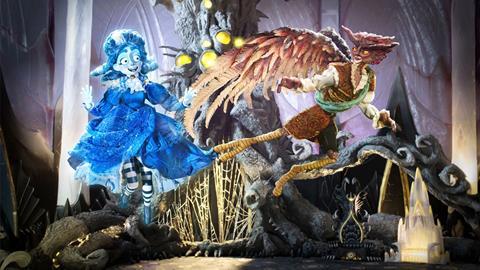
Mexican filmmakers Guillermo del Toro and Jorge R. Gutiérrez, two of the biggest names in international animation, are in Annecy this week to present masterclasses and fly the flag for Mexican animation, this year’s country of focus at the festival.
Del Toro is hosting a special screening of Pinocchio and Gutiérrez will do the same with The Book of Life.
They join leading lights from the Mexican animation industry at the Annecy Animation Festival to celebrate the country’s rich tradition and showcase its embrace of innovative techniques.
“A driving force for Mexico’s strong animated tradition is our pictorial and cultural heritage, our Mesoamerican legacy, muralism, surrealism and our embrace of the hyper-realism movement,” says José Iñesta, director of the leading animated Pixelatl festival.
Professionals from companies including Anima Estudios, Taller Del Chucho, Cinema Fantasma, Fotosíntesis Media, Casiopea and Estudios Grande are at the festival to look for partners and financing.
Various Mexican films and filmmakers are represented throughout the festival. Two shorts by Mexican filmmakers are competing in the official selection: Patricio Plaza’s Flesh Of God and Rita Basulto’s Smoke.
Aria Covamonas’ I Can’t Go On Like This features in the Off-Limits showcase, while Miguel Anaya’s K8 and Amanda Woolrich’ Shifting are in Perspectives. Marcos Almada’s Dr. Gecko’s Show is screening in TV Films, and a second work by Almada, Common Seas ‘Blood Type: Plastic is in Commissioned Films.
Víctor Mayorga Figueroa’s Mexico-Brazil-France co-production The Mark Of The Jaguar is participating in the Meet the Producers – Gap Financing day. The feature draws on Aztec mythology and heritage as the protagonist battles darkness with the help of his tight-knit community.
Stop-motion specialists
Along with Brazil, Mexico is the big animation industry of Latin America, renowned for its mastery in particular of stop-motion animation. Leading proponents include Guadalajara-based outfit Rigo Mora and Mexico City’s nascent outfit Cinema Fantasma. Founded in 2011 by the Ambriz brothers, 60 animators are now working on five projects for Cinema Fantasma. One is Frankelda And The Prince Of Spooks, a co-production with Turner Broadcasting and Cartoon Network Latin America, that is being presented as a work-in-progress in Annecy. The stop-motion feature is a follow-up to popular TV series Frankelda’s Book Of Spooks. The film dives in to the horror tales tradition through the eyes of a frustrated 19th century writer.
A further Mexican work-in-progress at Annecy is Juan Meza-León’s Aztec Batman: Clash Of Empires, being produced by Anima Estudios with Warner Bros Animation and Chatrone. The story is set in Mesoamerica at the time of the Spanish colonisation of central America. It follows a young Aztec boy whose father and village leader is murdered by the Spanish.
“The US market is important for Mexico in terms of financing and audience possibilities,” says Christian Bermejo, one of the curators of the work-in-progress showcase, who is based in Mexico City. “It is also crucial for us to strengthen bonds with Europe, not just for accessing public funds through co-productions, but also for a reason of artistic sensibility.”
Bermejo points to the ongoing work in this direction by La Liga, a support programme for animation projects from Latin America, Spain and Portugal, and by the pan-regional funding organisation Ibermedia. The latter is opening a call for projects at Annecy called Ibermedia Next.
“The Ibermedia Next program is a great opportunity,” says producer and curator Lucía Cavalchini, whose credits include competition entry Flesh Of God and Camilla Uboldi’s Oxitocity. “We need to rethink public support and international alliances, and to build bridges and links with Latin America.”
The New Voices section at Annecy is introducing the international industry to Gabriela Orozco’s Exile, Susana Arrazola’s stop-motion Amphibia, Emilia Schettino’ Sisters and Christian Arredondo’s The Borderline.
International partnerships
Of the total 258 features produced in Mexico in 2022, six were animations, according to national institute Imcine. To grow this number, the industry is calling for greater funding. “Capitalise on the financial incentives that have been created so that the government continues to invest more in this sector,” suggests Iñesta of the Pixelatl festival.
He is referring to the Focine Fund which has seen its 2023 provision increased 78% over 2022 to $10.7m and the Eficine 189 tax break which both both include animated works.
“We also need to learn to co-produce internationally,” adds Iñesta. “There is a lot of animation in Mexico but we don’t always own the intellectual property rights. We need more international alliances.”

























No comments yet